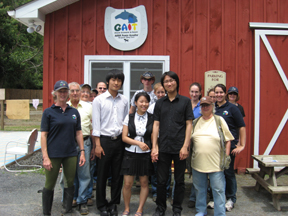 Since 1969 Professional Association of Therapeutic Horsemanship International (PATH Intl.) has provided resources for equine-assisted activities and therapies programs, developing and promoting the voluntary standards that guide the industry. Each year dozens of new centers initiate programs, and more than 62,000 individuals with and without special needs are served annually. With more and more requests and questions about PATH Intl. standards and credentialing programs coming from countries outside of the United States, PATH Intl. has formed a task force to develop a plan for addressing international growth.
Since 1969 Professional Association of Therapeutic Horsemanship International (PATH Intl.) has provided resources for equine-assisted activities and therapies programs, developing and promoting the voluntary standards that guide the industry. Each year dozens of new centers initiate programs, and more than 62,000 individuals with and without special needs are served annually. With more and more requests and questions about PATH Intl. standards and credentialing programs coming from countries outside of the United States, PATH Intl. has formed a task force to develop a plan for addressing international growth.
International Position Statement
We have listed members from a variety of geographic/language/cultural backgrounds to assist and answer any questions you may have about PATH Intl.
Contacts
Mexico and Latin America
This email address is being protected from spambots. You need JavaScript enabled to view it.
Europe
This email address is being protected from spambots. You need JavaScript enabled to view it.
Fundació Teràpia a Cavall
Apartat de correus 76
08480 L'Ametlla del Valles (Barcelona - Spain)
Phone: 34 606967085 (from 8 a.m. until 8 p.m.)
www.fundacioterapiaacavall.org
PATH Intl. Staff Liaison
This email address is being protected from spambots. You need JavaScript enabled to view it.
Phone: (800) 369-RIDE (7433), ext. 116
Fax: (303) 252-4610
International Certification
International Certification
International Certification Application Booklet
Workshops
As international interest in PATH Intl. continues to grow, and the numbers of requests for workshops to be held in countries outside of the United States are increasing, PATH Intl. feels it is important to assume a “proactive” position in regards to international expansion and use of PATH Intl.’s standards. PATH Intl. is excited about these new opportunities to share knowledge about the benefits of equine-assisted activities and therapies around the world, and would like to make sure PATH Intl.’s standards for safety and effectiveness are implemented in a positive and consistent manner around the world. To promote international expansion, PATH Intl. has developed a checklist to guide international centers in hosting PATH Intl. workshops and certifications. This International Checklist outlines a step-by-step process and list of considerations for hosting PATH Intl. events, and the PATH Intl. staff is always available for assistance and support. The PATH Intl. staff is working hard to make sure that, as the organization and our programs grow, we maintain the same high standards you’ve come to expect from PATH Intl. If you have any questions please contact This email address is being protected from spambots. You need JavaScript enabled to view it..
Please visit the PATH Intl. Events Calendar for workshop dates.
International Higher Ed
The PATH Intl. Higher Education Membership positions colleges and universities that incorporate PATH Intl. instructor training certification within their curricula as some of the best resources for the student population. This includes international universities and institutions of higher learning. Click here to visit the Higher Education page.
International Update - October 18, 2011
Note: Leif Hallberg recently presented at the European Horse Commission's annual event in Stavanger, Norway. This article reflects her opinions and thoughts on the experience.
Leif Hallberg Presents in Norway
In September I was invited to present at the European Horse Commission’s annual event in Stavanger, Norway. The title of my presentation was “An Overview of Equine Assisted Activities and Therapies in the US." This presentation showcased the growth and development of EAAT across the United States and focused on the great strides PATH International has made over the past few years to help unify, standardize and professionalize the field. Following this presentation, I travelled to Oslo, Norway, where I held a three-day workshop titled “Horse Interactions for Mental Health and Learning in the USA” at the Oslo University Hospital.
Both of these events were organized by one of PATH International’s Equine-Facilitated Psychotherapy/Equine-Facilitated Learning Membership (EFP/EFL) Task Force members, Ann Kern-Godal, who recognized the need for mutual exploration and learning across the Atlantic.
The workshop, which was hosted by Hest og Helse (Horse and Health – Norway’s equivalent to PATH International’s role in the United States), was the more interactive of the two events. Our objective was to explore the theory, practice and professional processes of EFP/EFL in the Unites States and to provide informed discussion about the future development of Norway’s approach to EFP/EFL. The emphasis throughout was on explaining the theoretical and demonstrating the practical application.
Oslo University Hospital has had five horses located on the beautiful hospital grounds for more than 30 years. The horses are owned by the local Lions Club and cared for by patients under the supervision of qualified staff. The current herd (two cold bloods and three warm bloods) is the responsibility of the hospital’s Department of Youth Addiction Treatment, and the horses work exclusively with addicts in treatment aged 16 to 26 years. The central location of Stallen (The Stables), the historic building complex (dates from the mid nineteenth century) and the very extensive and wooded grounds of Oslo University Hospital’s Gaustad complex makes this an exceptional setting for EFP/EFL, where the horses and related activities are an integral part of a much larger health service. Stallen has taken a lead within Hest og Helse in its development of EFP/EFL and is rapidly gaining recognition in Europe.
Twenty-five people from four nations with a range of horse-related backgrounds and qualifications attended and participated very actively, despite the weather and bugs, throughout the three days. I came away with a feeling that the US experience was very useful and relevant to both organisers and participants. I was impressed by the very open and professional discussion – no stultifying effect of “politically correct” horse language here, nor the sometimes difficult-to-handle emergence of individual personal issues that sometimes confronts us, which is more suited to a therapy session than to a workshop. Perhaps the most interesting aspects for me were the strength of a hospital-based program (there are four such programs in Norway) in terms of integration of EFP/EFP into the overall therapy program and the strong emphasis on research (not so difficult when you have the homogeneity of a single diagnostic group, a specified age, in this case 16-26 years, and a major database of relevant information that will be maintained and available for approved research for 30 years).
From PATH Intl.’s perspective, if we are to be serious about the “International” part of our new name, we will need to find ways to work more intensely with “sister organisations” such as Hest og Helse, to help them where we are stronger, particularly on issues such as standards, procedures, etc., and to find ways to reap the benefits in areas such as research, which are offered by large institutions in Europe, such as Oslo University Hospital.
This is just a beginning and I look forward to exploring all the ways we can connect and share resources and information internationally in future visits.
PATH Intl. Region 8 News - January, 2010

January 11-13, the Chisholm Challenge Horse Show 2010 kicked off the Fort Worth Stock Show with a point-earning AQHA show on Monday, followed by two days of competition of showmanship, horsemanship, trail, driving and drill.
One hundred and six contestants, from nine PATH Intl. Centers, earned Chisholm Challenge belt buckles and FWSS ribbons.
The outstanding horse of the show was Domino from All Star Equestrians. He exemplified what a program horse should be—steady, unflappable, willing and proud to do his job.